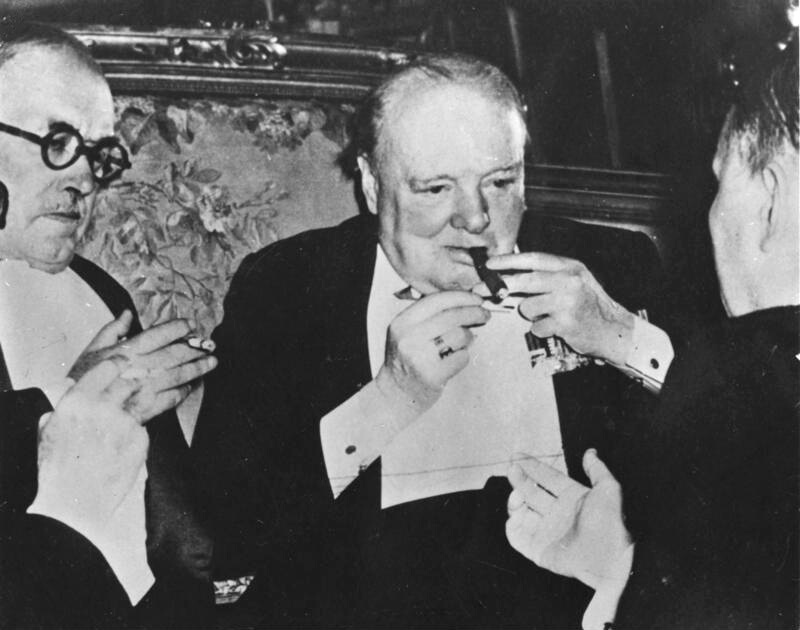Movie Gets a Lot About Churchill Right, Even the Drinking
Why do so many American devotees of Winston Churchill work so hard to play down his drinking? That is a question that has interested me for some time.
One man I know — who owns several of Churchill’s paintings — avers Churchill didn’t drink much, just sipped frugally on an ever-present glass. He is one of a line of Churchill admirers who don’t want to think Churchill drank incessantly. But the evidence is there, from the writer Nicholas Monsarrat to his hostess Eleanor Roosevelt.
The revisionists want him sober through the war years. I doubt he was falling-down drunk, but his consumption of alcohol (especially Scotch and Champagne, which he started on at breakfast) was awesome — as was everything else he touched.
I raise this because, for me, the furniture of the holidays includes a movie. So I went to see “Darkest Hour,” the biographical story of the first days of Churchill’s premiership in May 1940. Germany was invading Belgium, France, Luxembourg and the Netherlands. The British army and allies — 338,000 of them — were trapped on the French coast at Dunkirk.
The movie is remarkable in fidelity, touching on all the high points from Foreign Secretary Lord Halifax’s hope of making peace with Hitler, through the dubious offices of Mussolini, to the last cautious but patriotic endeavors of the deposed prime minister, Neville Chamberlain. Chamberlain is treated as he was: a man up against history forced to bargain with Hitler, while a weak Britain rearmed. The real appeaser was Halifax, who later was sent to Washington, where he endeavored to undermine Churchill. The movie does justice to the booze, too.
I was especially glad to see the movie recognized the genius and courage of the evacuation of the army at Dunkirk by an armada of many hundreds of small boats, some just seaworthy. The enormity of the operation was somehow missed in the movie “Dunkirk,” which came out earlier in the year.
Joe Wright’s movie jams in many little episodes loved by the Churchill cognoscenti, like Churchill’s habit of working from bed with terrified dictationists on hand and, of course, always with a glass in reach; his habit of walking around naked, no matter who was there; and the little funny of his encounter with Clement Atlee, the Labor Party leader, when Churchill was in the toilet.
I both salute Gary Oldman’s bravura performance and question his interpretation of Churchill as a somewhat doddery, old, old man. He was just 65 and according to his newspaper publisher friends, like Brendan Bracken and Lord Beaverbrook, was at his peak. Likewise, Lord Boothby, who helped engineer Churchill’s rise to the highest office.
On YouTube, you can find film of Churchill addressing Congress in April 1943. I submit he is more robust and spry than in the performance that Oldham gives, even if the great man — maybe the greatest Englishman — had already had a few.
In Praise of Short Books That Do the Job
Many of my friends write books — and I admire them their industry — but not all.
One very literate journalist, when I asked her why she hadn’t tried her hand at authorship, came back with, “You wouldn’t want to lock me up in a room with all those words, would you?” Quite so.
Nonetheless, books are becoming important to journalists in a way they weren’t earlier. There being no magazines left in which large arguments can be advanced, books are the answer.
Gone are the days in which a writer like Stewart Alsop could argue the Vietnam War in 7,000 words in The Saturday Evening Post. If you want to write something weighty these days, write a book.
But publishers insist on a certain number of pages. The result is many books are too long, padded.
I’m grateful to two friends who’ve written short books that make their point. There is Tim McCune’s “Smoke Over Bagram,” a revealing look at the contractor’s life in the surreal world of Afghanistan after the U.S. invasion, and Kevin d’Arcy’s “Adventures in the Gardens of Democracy.”
McCune’s can be found on Amazon as a virtual book. D’Arcy’s book, which is about British journalism and the decline of representative democracy, is published by a small British house, Rajah.
I thank them for saying what they have say without padding. No pea of an idea in haystack of words for either. So I devoured both books with joy and without giving over days of my time.
The Things They Say
“Nothing corrupts a politician as much as friendship. Good politicians don’t bribe; they make us like them.” — Matthew Parris, journalist and former Conservative member of the British House of Commons
Photo: “Potsdamer Konferenz, Winston Churchill” This file is licensed under the Creative Commons Attribution-Share Alike 3.0 Germany

 Follow
Follow
Leave a Reply